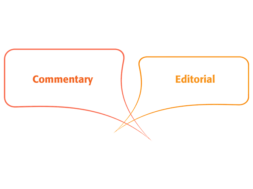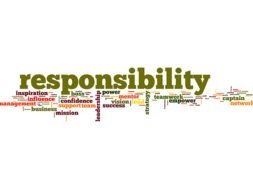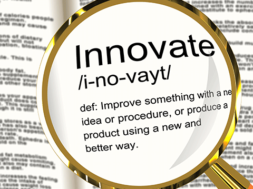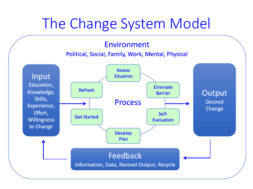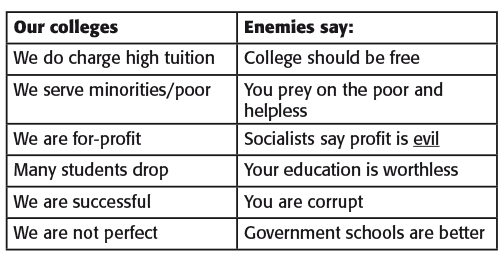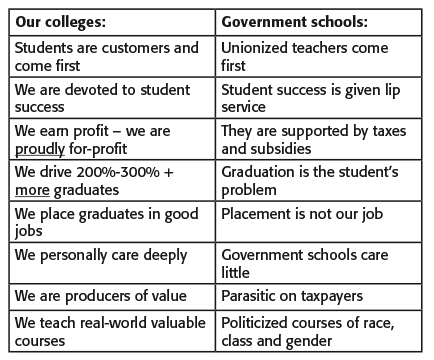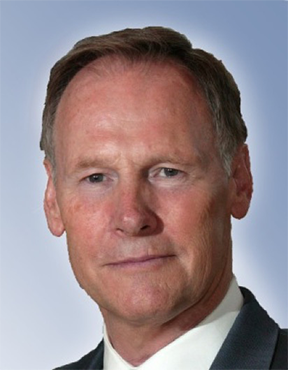
Moral Certainty Vs. Guilt
By Carl B. Barney, Chairman, Center for Excellence in Higher Education
Private career colleges graduate students at a much higher rate, in much less time, and (when all costs are considered) at a lower cost than community colleges. Given that private career colleges and community colleges serve a similar type of students, private career colleges are by far the best option for these types of students.
Private career colleges are good and decent colleges. What does “good and decent” mean? It means we help people change their lives for the better through focused career education. It means we are dedicated to helping students graduate and get a much better job leading to higher earnings, benefits, promotions, and a better life.
Every day, in dozens of ways, we devote ourselves to the task of helping students have a chance for success and happiness. We do remarkable things for our students. We have:
- Free tutoring
- Free advising
- Teachers with real-world experience
- Same textbooks as other colleges
- Career services
- Work-focused curriculum
- High-value programs
- Focus on student satisfaction and success
- Free remedial education
- Thoughtful education-based admissions
No other college sector does all this.
While we know the great things we do, we need to know and appreciate this deeply. We need to know and appreciate that we are decent, honest people doing good things every day to help our students. We need to be convinced.
We are not “perfect.” No organization is. Sure, our graduation rates and employment numbers could be better, and we are dedicated to improving them. But compare our graduation rates to the community colleges. Nationwide, private career colleges graduate students at over 60 percent, and community colleges at a dismal 20 percent. Also, consider too that many of our students have already failed at community colleges.
Enemies of career colleges
We have enemies. They are opposed to our model of higher education and fully intend to harm us; they intend to cripple and close our colleges – they have already closed many hundreds of schools. Our enemies are not good people with good intentions. They are bad people with bad intentions doing bad things. They lie, exaggerate, falsely accuse us, and make up the most awful and disgusting defamations. Who are they? There is a long list of villains; see my letter to the Secretary of Education, Arne Duncan (attached). In addition to these, there are some unscrupulous Attorneys General and some of their staff, some community colleges, and various unions such as teacher, education, and public employee unions. Plaintiffs’ attorneys run seminars to instruct their brethren how to suit and fleece us.
With righteous indignation, “victims” exaggerate petty grievances. They can say anything, make up anything. And they do. They require no evidence, no facts. Our enemies trump up charges against us and recruit perjurers to give false testimony. They create plaintiffs and false witnesses, whose payment is the cancellation of their student loans and possibly a share of the extorted loot.
When our enemies file a lawsuit, what is their purpose? They want money. In reality, it is extortion. It is theft.
They posture as “moral crusaders” or as courageous “whistleblowers.” We shouldn’t be fooled.
All they want is our money. In addition, they want to deplete our resources and exhaust us. Finally, they want to put us out of business.
The media propaganda and lawsuits against us essentially say: “You are corrupt people doing awful things.” They assert vague allegations that our advertising is false and misleading; that most of our students drop out; that graduates do not get jobs, or they get low-paying jobs; that we recruit “the homeless” and “mentally disabled” students; that our education is “worthless.” The lies go on and on. They make up the most odious and absurd slanders and spread them through the media and the courts.
When we hear and read all this stuff, it is natural for us to have doubts and reservations. We might think “perhaps some of this is true; after all, we do make mistakes; students do drop out; some do not get good jobs paying a higher salary; we are not perfect.” The relentless attacks can cause a sense of defeatism, despair, and fatalism.
Our enemies have to undermine our confidence, make us uncertain, make us doubt, make us feel guilty. Guilt is our enemies’ game. Guilt gives our enemies the opening they need to get to us. Guilt is their racket.
Ayn Rand writes:
“That’s what I regard as the most immoral thing on earth: to attack a man not for his flaws but for his virtues… some people will attack you for exercising your ability – for hard work, for consistency, for ambition – and they will want to make you feel guilty for it. That is the greatest evil according to my philosophy.”
Guilt
Guilt is a corrosive, demoralizing and incapacitating emotion. It makes one weak, reluctant, and submissive. Guilt is used as a weapon by those who want to dominate and control others. It has been used for centuries and it is effective. It works.
A massive guilt trip has been mounted against private colleges. This is obvious. It is all over the internet, it’s all over television and it’s all over print media. Private colleges are being vilified by political propaganda from unscrupulous politicians and stooges for the teachers and education unions, plaintiff’s attorneys, and other victims’ groups.
Guilty? or Not?
We have soul-searched: Have we done wrong? Is there something wrong with our colleges? Are we guilty?
It can be hard not to feel guilty.
Not being perfect is not a moral breach. Perfection is an impossible standard.
We need to identify the crucial difference between errors of knowledge and breaches of morality. We need to deeply learn and keep in focus the difference: errors of knowledge (mistakes) versus breaches of morality (real wrongs).
There is earned and unearned guilt. If guilt is earned, we correct it routinely. To some degree, some have accepted unearned guilt – accepted the ugly accusations and are apologizing.
“The worst guilt is to accept an unearned guilt.” – Ayn Rand, author of “Atlas Shrugged.”
Our enemies simply “know” (primarily because we are for-profit or private) that we are “bad actors.” All they have to do is file a suit and demand and review tens of thousands of documents, pick over these documents, pull things out of context, find some law that may fit, and then trump up charges to make us feel guilty. If we accept their scam, we are finished! (And at this point, we are losing.) If we feel guilty (unearned guilt), we will submit and settle as most have done.
Unfortunately, some have accepted unearned guilt because they did not have the strength or the moral certainty to fight back. This quote from “Atlas Shrugged” makes the point:
“There is no way to disarm any man … except through guilt. Through that which he himself has accepted as guilt … He’ll bear any form of misery, he’ll feel that he deserves no better … He won’t defend himself. He won’t feel he’s worth it. He won’t fight.” – Ayn Rand
Guilt is being created by criminalizing ordinary company activities. See the attached articles, The Criminalization of American Business and Criminalizing the American Company, A Mammoth Guilt Trip. Note that these articles are from The Economist, which is a moderately leftist publication.
Kinds of guilt
Basically, there are three kinds of guilt.
- Misguided guilt based on false standards such as: we should graduate 100 percent of students, we should place 100 percent of graduates, we should never make mistakes; we should be perfect. These are false values and criteria that no college can achieve. Since we cannot meet these unrealistic standards, we may feel guilty.
- Unearned guilt is related to number one above. Accepting guilt based on false accusations or for a mistake or an error of knowledge. An error of knowledge is not a breach of morality. In this case, no guilt is earned. This idea needs to be deeply understood.
- Earned guilt is guilt from committing a real, harmful act, such as lying, cheating, stealing, or deliberately hurting another. This is earned guilt. If guilt is earned, it must be corrected immediately and fully. Compensate any who have credible damages.
We should not accept unearned guilt. It is immoral to do so.
Appeasement of enemies
Appeasement may feel good. The problem temporarily “goes away.” But it doesn’t ever completely go away – it never does. Plus, an appeasement can make us feel as though we sold out. No matter how good we may feel in the short run, in the long run we will regret it. A victory by an enemy, or a partial victory, from an unjust claim, encourages the claimant to try it again. They will and do come back for more. We’ve experienced this. We’ve seen this again and again.
Appeasement leads to horrific results. Some colleges that have been attacked settled with their attackers; but their enemies came back again; some of those colleges are now out of business.
If we appease and don’t fight back, they will keep coming back at us with more lies and efforts to dominate, punish us, steal our money, and finally put us out of business.
Some may lack moral certainty or not have the knowledge to fight. They may be frightened of upsetting the opposition, the adversary. But isn’t that what the adversary process is all about – about combat and fighting? Why would we be frightened of upsetting or hurting our enemies? They should be treated like the bullies they are. Ayn Rand wrote:
“I saw that there comes a point, in the defeat of any man of virtue, when his own consent is needed for evil to win – and that no manner of injury done to him by others can succeed if he chooses to withhold his consent. I saw that I could put an end to [their] outrages by pronouncing a single word in my mind. I pronounced it. The word was ‘No.’” And:
“But no one speaks out for [private colleges], when they are attacked and insulted by everyone as a matter of routine. What causes this overwhelming injustice? … their appeasement of enemies, their compromises – all of which add up to an air of moral cowardice.” And:
“One must speak up in situations where silence can objectively be taken to mean agreement with or sanction of evil. When one deals with irrational persons, where argument is futile, a mere “I don’t agree with you” is sufficient to negate any implication of moral sanction. When one deals with better people, a full statement of one’s views may be morally required. But in no case and in no situation may one permit one’s own values to be attacked or denounced, and keep silent.” [“How Does One Lead a Rational Life In an Irrational Society?” VOS, 92; pb73.]
We must not accept unearned guilt. We must not appease our enemies.
Moral certainty
How do we achieve moral certainty? Moral certainty comes from our code of virtues, our moral code. What is our code? What values do we hold and pursue?
Who is the bad actor? We are vilified for our virtues.
The above is a code of virtues. Virtues are the acts and practices by which we conduct ourselves and our business. It is also a moral code – a secular moral code. This is a code by which we help our students to succeed and graduate, and for our colleges to flourish. We enormously surpass government-sponsored schools. Some of them hate us for our success and profit. That’s what has brought this foulness into our lives.
What can we do?
- Recognize that dreadful, blatant lies are being told about us; that those telling these lies are bad people; they are liars and many know it. They want the power to dominate us and force us to do their bidding. They extort our time and extort our money. We must reject their lies with disgust. Their lies are disgusting.
- Convince ourselves of the rightness of our dedication and work. Fight for our right to exist and do our work. Utterly refuse to accept unearned guilt. Know that accepting an unearned guilt is wrong and soul-destroying.
- Know that we are good and decent colleges. Not perfect! Who is? We are doing very good things; we are dedicated to helping our students graduate and get a much better job as soon as possible. That’s what we do every day. If some believe that this is wrong and bad, then they are wrong and bad. Let us burnish our self-esteem by knowing and appreciating that we are good and decent.
- Standup! Stand tall! Speak up! Don’t let our enemies get away with their lies; reject them. Fight back with righteous pride and moral confidence. Be courageous (see the samples attached of speaking out).
Our goodness
Our colleges are the most innovative, productive, results-producing of the post-secondary educational sector. We take the toughest students and we work hard to graduate them, and we do this magnificently.
Why do students go to college – for a better job? Yes, but that’s not the main reason. (A person may have many jobs.) Students need and want to graduate with a degree. That’s what they pay us for! The degree goes on their resume and lasts a lifetime. A degree is their ticket to the future – better jobs and more money.
Why are we so successful? For the same reason any other business is successful – we provide a valuable service that our customers want and cannot get satisfactorily elsewhere.
We put our heart and soul into helping our students graduate and get a degree. We care! Most government schools do not care so much. Government schools fail students; they do not graduate students. We work our hearts out to retain and graduate students; and we graduate them at two to three times the rate of government schools. We need to convince ourselves of the rightness of our education and fight for our sector with full moral certainty.
We are the good guys. We must stand tall and proud. We must speak out and act with moral certainty.
View additional documents referenced in the text:
Letter to Arne Duncan, Secretary of Education
Letters to AG Suthers (11/25 and 11/26/2014)
Speaking Up Memo
Rule of Law vs. Rule of Men, by Scott Ritsema
The Criminalisation of American Business (Corporate settlements in the U.S.)
Criminalizing the American Company, A Mammoth Guilt Trip
CARL BARNEY is the President and Chief Executive Officer of LePort Schools, which comprise 22 high-quality Montessori schools. Formerly, he was the Chairman and CEO of the Center for Excellence in Higher Education (CEHE), a group of 18 colleges (Stevens-Henager College, CollegeAmerica, California College San Diego) and Independence University, educating 10,000 students. He currently serves as the Chairman of CEHE. He built one of the most successful groups of private career colleges, and is considered a leader in the post-secondary private college sector, especially known for speaking up and taking moral stands against the shameful attacks on private career colleges.
Along with John Allison, he was awarded the prestigious Atlas Award by the Board of the Ayn Rand Institute (ARI).
He conceived of, planned, and funded the ARI Campus, which he continues to fund so that thousands of young people can study complete courses in philosophy and thus develop a fuller understanding of the philosophy of Objectivism.
He serves on the Board of Directors of ARI, The Clemson University Institute for the Study of Capitalism, The Cato Institute, Business Educators Research Associates, LePort Schools, and CEHE.
Contact Information: Carl B. Barney // Chairman of the Board // Center for Excellence in Higher Education // 801-270-005 // carl.barney@independence.edu


